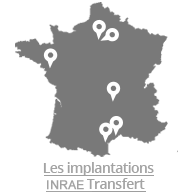 NEFERTITI: Networking European Farms to Enhance Cross Fertilisation and Innovation Uptake through Demonstration
NEFERTITI: Networking European Farms to Enhance Cross Fertilisation and Innovation Uptake through Demonstration
Objectives
NEFERTITI is a unique project that establishes 10 thematic networks bringing together regional clusters (hubs) of demo-activities and the involved actors. The project focuses on creating added value from the interactive exchange of knowledge and technical content among farmers and AKIS actors (Agricultural 10 interactive thematic networks will be established bringing together 45 regional clusters (hubs) of demo-farmers and actors involved (advisors, NGOs, industry, education, researchers and policy makers) in 17 countries. The project NEFERTITI focuses on creating added value from the exchange of knowledge, actors, farmers and technical content between networks in order to boost innovation uptake and to improve peer to peer learning and network connectivity between farming actors across Europe. In the end, it all contributes to a more competitive, sustainable and climate-smart agriculture.
The project NEFERTITI addresses 10 themes that have been chosen based on key concerns of the farming communities. Together they cover a balanced range of topics in the three main agricultural sectors: animal production, arable farming and horticultural production.
A monitoring and learning program supports the systematic extraction of lessons learnt, lessons to be shared with wide audiences including AKIS (Agriculture Knowledge and Innovation Systems) actors and public authorities. A web based platform unlocks the experience, actors, demo details and the related content for widespread sharing, enhanced by the dedicated production of relevant material (including high-quality videos) in each partner’s language. NEFERTITI will engage a policy dialogue with EU Regions to meet farmers and policy makers’ interests in view of the networks’ sustainability.
The overall objective of NEFERTITI is to establish an EU-wide highly connected network of well-specified demonstration and pilot farms designed to enhance knowledge exchanges, cross fertilisation among actors and efficient innovation uptake in the farming sector through peer-to-peer demonstration of techniques to be organised by themes.
The main project objectives are six:
At the support level:
- Developing dynamic action plans by identifying the needs of demonstration actors and networks’ in terms of knowledge and know-how for thematic network activities;
- Supporting cycle of demo-activities and peer-to-peer learning in the regional hubs of demo activities and related actors that will be established. O2 is aimed at learning by doing on how to improve uptake of knowledge among farmers and improve science-practice interactions;
- Establishing a web-based platform including knowledge tanks related to demo-activities incorporating ready-to-use knowledge from other national, EU and EIP related projects, organised by themes and sectors.
At the coordination level
- Establishing and sustaining interactive thematic networks at regional, national and EU levels by sectors and themes (and with the EIP related projects/landscape) to boost knowledge exchanges and cross fertilisation;
- Fostering the learning process of all actors involved in demo-activities throughout the networks to identify best practices for demonstrations and interactivity between demonstrations on similar themes over Europe;
- Improving the policy dialogue and networking the regional European Structural Investment Fund (ESIF) managing authorities to ensure the network sustainability;
- Promoting effective use of demo-and network activities by communicating and disseminating the practical oriented outcomes adapted at local level.
EC funding : 7 000 000€
Duration : 4 years
Start : 1st January 2018
Coordinator : Adrien Guichaoua, adrien.guichaoua@acta.asso.fr
Project manager : Emna Ben Hamza, Emna.BenHamza@inra.fr
Website : nefertiti-h2020.eu
 IBISBA 1.0:
IBISBA 1.0:


 NEFERTITI
NEFERTITI
 The objective of GenTORE is to develop innovative genome-enabled selection and management tools to optimise cattle resilience and efficiency (R&E) in widely varying environments. These tools, incorporating both genetic and non-genetic variables, will be applicable across the full range of systems (beef, milk and mixed), and will thereby increase the economic, environmental and social sustainability of European cattle meat and milk production systems.
The objective of GenTORE is to develop innovative genome-enabled selection and management tools to optimise cattle resilience and efficiency (R&E) in widely varying environments. These tools, incorporating both genetic and non-genetic variables, will be applicable across the full range of systems (beef, milk and mixed), and will thereby increase the economic, environmental and social sustainability of European cattle meat and milk production systems.